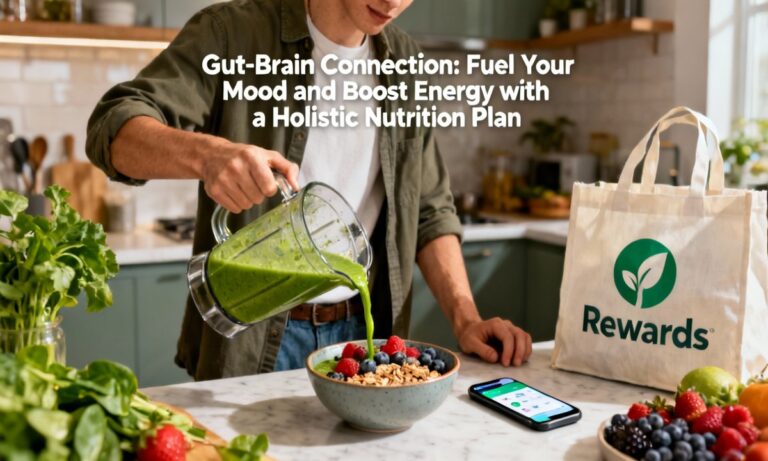Ever felt your stomach churn before a big presentation or noticed digestive issues when life gets overwhelming? This common experience highlights the profound connection between your gut and your brain. This intricate relationship, known as the gut-brain axis, profoundly influences your physical well-being, mood, and overall mindset. This guide explores the science behind this connection, offering insights into foods and habits that nurture both your digestive system and your mental state.
Understanding the Gut-Brain Axis
Your digestive system and brain are in constant communication, linked by a complex network of nerves, hormones, and gut microbes. This communication pathway is often referred to as the mind-gut axis. Within your gut lies a vast network of millions of neurons and trillions of bacteria, sometimes called your “second brain” by scientists.
This means that your dietary choices and lifestyle habits can significantly impact your emotional state and cognitive function. Recognizing this powerful connection empowers you to take proactive steps toward enhancing both your mental and digestive well-being. Emerging research indicates that a balanced gut environment supports emotional stability, boosts cognitive performance, and contributes to a greater sense of happiness.
The Gut’s Role in Mood Regulation
Your gut hosts a diverse community of bacteria, the microbiome, which is vital for digestion and immunity. This microbial ecosystem also plays a crucial role in producing neurotransmitters, like serotonin, a key chemical that regulates mood. Surprisingly, about 90% of your body’s serotonin is manufactured in the gut, not directly in the brain.
When your gut microbiome flourishes, your mood often benefits. Imbalances from poor diet, stress, or illness can trigger digestive issues and mood swings. Research suggests people with healthier gut bacteria patterns report less anxiety and depression. If you experience frequent bloating, low energy, or unexplained mood shifts, consider your gut health. Simple food swaps and daily habits can transform your mind-gut axis. For more on healthy eating, explore our advice on stress-free weeknight dinners.
Nourishing Your Gut and Mood Through Food
The adage “you are what you eat” holds significant truth for your gut-brain connection. Prioritize a diverse intake of fiber-rich, plant-based foods, fermented items, and lean proteins. These choices lay the foundation for a thriving gut microbiome and a more balanced mind.
Beneficial Bacteria from Fermented Foods
Foods such as yogurt, kefir, sauerkraut, kimchi, and tempeh are excellent sources of probiotics. These beneficial bacteria are known to regulate digestion and can help mitigate stress. Incorporating these regularly into your diet may enhance both gastric function and emotional equilibrium.
Fiber-Rich Fruits and Vegetables
Apples, bananas, leafy greens, artichokes, and various berries provide prebiotics, which are essential for feeding your beneficial gut bacteria. A diet rich in fiber not only stabilizes your digestive system but also contributes to the production of feel-good hormones. Explore our plant-based recipe ideas for more inspiration.
The Power of Omega-3 Fatty Acids
Found in sources like fatty fish (salmon, sardines), flaxseeds, and walnuts, omega-3s are crucial for reducing inflammation throughout your body, including your gut and brain. Research links adequate omega-3 intake to improved mood, reduced anxiety, and fewer digestive upsets.
Polyphenols for Gut Diversity
Vibrantly colored foods, such as berries, red cabbage, turmeric, and dark chocolate, are rich in antioxidants. These compounds protect your digestive tract and help counter the effects of stress. They also contribute to a diverse gut bacteria population, which is key for overall resilience.
The Importance of Hydration
Dehydration can slow down digestion and quickly diminish your energy levels. Consuming ample water or herbal teas is one of the simplest and most effective ways to stabilize your gut and maintain mental clarity. If you’re looking to eat well on a budget, find tips for healthy shopping without overspending.
Daily Practices for an Optimized Gut-Brain Axis
Beyond dietary choices, integrating mindful daily practices can significantly nurture your gut-brain connection. Consider incorporating these simple habits into your regular routine to foster a healthier mind and gut.
Mindful Mealtimes: Before eating, take a few deep breaths and chew your food slowly. This practice signals your body to relax, which can reduce digestive stress and improve nutrient absorption.
Regular Movement: Engaging in gentle physical activity, like walking, yoga, or gardening, stimulates digestion and releases endorphins. Even 20 minutes a day can lead to a noticeable positive difference in your well-being.
Prioritize Quality Sleep: Adequate, restful sleep is essential for regulating gut bacteria and maintaining hormonal balance. Aim for 7–9 hours of undisturbed sleep each night to support your body’s natural rhythms.
Effective Stress Management: Simple stress-reducing habits, such as journaling, guided breathing exercises, or meditative practices, have been shown to improve both gut health and emotional stability.
Maintain Consistency: Both your gut and brain thrive on routine. Eating, moving, and sleeping at consistent times each day helps strengthen these vital systems. For more routines supporting healthy living, explore actionable inspiration in meal prep guides.
Debunking Common Gut Health Myths
With the increasing focus on gut health, many misconceptions can arise regarding probiotics and dietary trends. It’s important to clarify some common misunderstandings to make informed choices.
It is a common myth that all probiotics are the same. In reality, different strains of probiotics offer unique benefits, emphasizing the importance of diversity in your gut flora.
Another misconception is that gut supplements can replace a healthy diet. While supplements can be supportive, they cannot fully replicate the benefits of a colorful, balanced food plan rich in whole foods.
Some believe that stress only affects the mind. However, stress can directly disrupt your digestion, potentially triggering symptoms even when your diet is otherwise perfect. This highlights the direct physical impact of mental stress.
Finally, the idea that bloating always indicates poor gut health is not entirely accurate. Occasional bloating is normal, especially after meals rich in fiber. Persistent or severe discomfort, however, warrants a discussion with a healthcare professional. To help manage stress and maintain balance, consider using smart kitchen tools and techniques.
Frequently Asked Questions about Gut-Brain Health
Can what I eat really impact my mood that much?
Absolutely. Foods high in processed sugar, unhealthy fats, or additives can trigger inflammation and alter your gut microbiota, potentially leading to irritability and low energy. In contrast, a diet centered on whole foods is known to support more stable moods and sustained energy.
How soon will I notice a difference in how I feel?
Your gut bacteria can adapt quite rapidly. Many individuals report experiencing positive changes—such as improved digestion, more stable energy levels, and enhanced focus—within one to two weeks of consistently adopting healthier eating habits and mindful daily routines.
Do I need to take a probiotic supplement?
For most people, a diverse diet rich in fermented foods is sufficient to support gut health. If you are experiencing specific digestive issues or have recently taken antibiotics, a targeted probiotic supplement might be beneficial, but it’s always wise to consult with your healthcare provider first.
What if I have food allergies or intolerances?
It’s crucial to prioritize your individual dietary needs. There isn’t a single, universal diet that fits everyone. Fortunately, many gut-friendly foods are also suitable for those with allergies, including various fruits, vegetables, and gluten-free whole grains.
Holistic Wellness: Environment and Lifestyle
Your living environment also plays a role in fostering a healthy mind-gut axis. Clean, organized spaces can help reduce stress, while incorporating indoor plants may contribute to a more positive atmosphere. Nurturing your physical space and daily habits genuinely supports every facet of your wellness journey. For more ways to build healthy habits and maintain ease, explore guidance on how small changes create meaningful impact.
Your Journey to a Happier Gut and Mind
Nurturing your gut-brain connection is an achievable and highly effective endeavor. Begin by making small, consistent adjustments to your meals, physical activity, and daily routine. Pay close attention to how various foods make you feel, and approach this journey with patience as your body adapts and responds.
Continue your wellness journey: Explore more healthy recipes and wellness guides to discover new favorites that celebrate the joy of a balanced life. Consider signing up for newsletters for exclusive health tips and updates delivered straight to your inbox.
Sources: All information is cross-referenced with reputable government reports and academic publications for the U.S. context.



